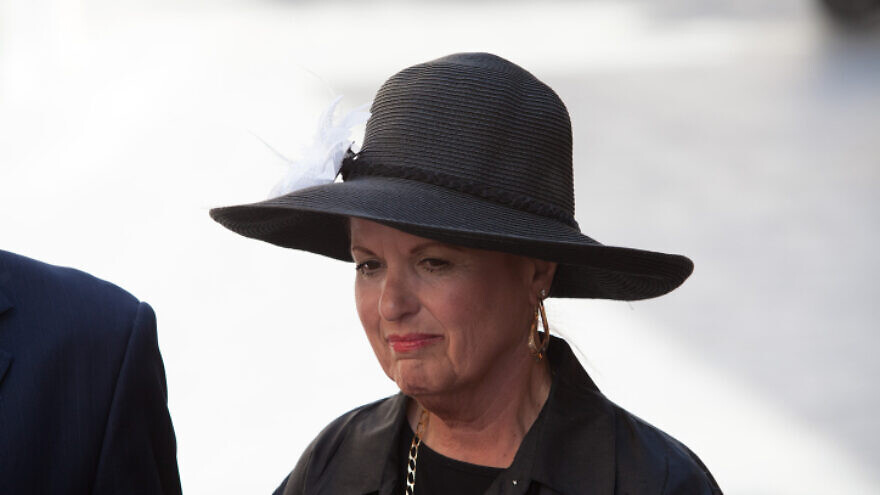This is being written in memory of Esther Pollard, who passed away on Jan. 31.
Esther was the wife of Jonathan Pollard, the former U.S. intelligence analyst who in 1987 pleaded guilty to spying for and providing top-secret classified information to Israel.
He was released on parole in 2015, under harsh restrictions that imposed a 7 p.m.-7 a.m. curfew; required him to remain within narrow boundaries unless granted special permission to travel elsewhere; and ordered to wear electronic monitoring devices to track his movements. In addition, press interviews and Internet access without prior permission were prohibited.
Five years later, he and Esther petitioned for and received permission to move to Israel, which they did on the evening of Dec. 30, 2020. They were greeted at the airport in the middle of the night by then-Prime Minister Benjamin Netanyahu and whisked to Jerusalem, where they settled.
We had numerous communications with Esther, keeping her informed of our progress. She was very supportive and appreciative of our efforts, which largely involved making contact with political figures and asking them to write letters advocating for Jonathan’s release.
David was aggressive and productive in garnering support. My personal efforts included asking then-U.S. President Barack Obama about Jonathan at the White House Hanukkah parties in 2013 and 2014. I raised the Pollard issue at the Conference of Presidents meetings in Israel with U.S. Ambassador Dan Shapiro each year from 2013 to 2015, when Jonathan was released on parole.
I worked closely with Professor Lasson on this project, and he kept in regular touch with Rabbi Pesach Lerner, then-executive director of the National Council of Young Israel. Rabbi Lerner was and continues to be close with Pollard. He spoke at Esther’s funeral.
Former CIA director James Woolsey told me that he did not believe that the infamous Weinberger Affidavit—in which former U.S. Defense Secretary Caspar Weinberger condemned Pollard’s “perfidy”—would ever be declassified. Accordingly, our strategy to defeat the main argument of Pollard’s opponents, according to which the classified information showed that he deserved the life sentence, was to find political officials familiar with it who thought it didn’t indicate that Pollard deserved a life sentence.
With God’s help, we ended up getting virtually every figure who was a major official at the time of Pollard’s arrest to come out in favor of his release. These included former President Ronald Reagan’s National Security Advisor Bud McFarlane, former Secretary of State George Schultz, former head of Senate Intelligence David Durenberger and former head of House Intelligence Lee Hamilton.
We also received tremendous assistance from former Assistant Secretary of Defense Lawrence Korb, who viewed Pollard’s punishment as a terrible injustice caused by Weinberger’s “visceral dislike” of Israel. Korb personally met with Netanyahu and helped convince him to publicly apologize for Israel’s using Pollard—an apology that helped lead to Pollard’s eventual release.
McFarlane likewise wrote that Weinberger had “unbalanced views” on Israel and that Pollard had suffered a “great injustice.”
McFarlane clearly viewed Weinberger’s actions as counter to U.S. interests and even signed a bipartisan affidavit with former head of Senate Intelligence Dennis DeConcini against Pollard’s onerous parole conditions.
Woolsey, who eventually came out strongly for Pollard’s release, said that one of his main jobs during the administration of former U.S. President Bill Clinton was to improve ties with Israel’s intelligence that clearly had been hurt because of Weinberger’s actions on Pollard.
Other important people versed in the classified information about Pollard also supported his release. These included DeConcini, former White House Counsel Bernard Nussbaum, former Deputy Attorney General Phillip Heymann, who lost his job in the Clinton administration due to his support for Pollard’s release.
We also were able to get letters of support from notable Americans like former Secretary of State Henry Kissinger, former U.S. Attorney General Michael Mukasey and former U.S. Ambassador to the U.N. Bill Richardson.
The injustice to Pollard was not only an individual matter; it but hurt U.S.-Israel relations. It resulted in many Jews working in U.S. government positions being discriminated against due to anti-Semitic actions by American officials.
The fight against this injustice was not easy, but Esther Pollard’s efforts never waned. Her dream of finally living a free life with Jonathan in Jerusalem finally came to pass. Very sadly, this dream was cut short after only a little more than a year ,with her untimely death at the age of 68.
May her memory be only for a blessing.
Farley Weiss, former president of the National Council of Young Israel, is an intellectual property attorney for the law firm of Weiss & Moy. The views expressed are the author’s, and not necessarily representative of NCYI.
Kenneth Lasson is an emeritus professor of law at the University of Baltimore. He writes widely in the areas of civil liberties and international human rights. His most recent book is “Sacred Cows, Holy Wars: Verities and Vagaries in Deciding What’s Kosher and What’s Not” (Carolina Academic Press).


























